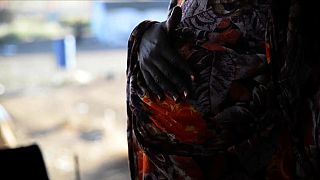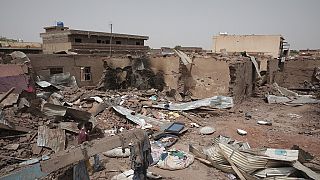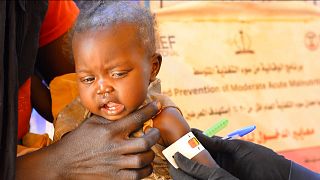Sudan
Under Omar al-Bashir, they said they were abandoned and even took up arms against him. Today, in post-"revolution" Sudan, Beja tribes in the east accuse Khartoum of always denying them the representation they say they deserve.
Settled for millennia in a region bordering Egypt and Eritrea, between the Nile and the Red Sea, with their customs, languages and traditional daggers, the Beja tribes are a thorn in the side of the transitional government.
Nomadic breeders and farmers, the Beja, who boast a history dating back to Kush -- grandson of Noah according to the Bible -- live 90% in rural areas in huts near the cities of Gedaref, Kessala or Port Sudan, explains to AFP the sociologist Moussa Said.
In 2018, when Sudan rose up against its overthrown autocrat the following year, the Beja -- about 4.5 million or one in ten Sudanese according to the last census conducted in 2008 -- were among the most active.
They have long claimed to be discriminated against and marginalized: the poverty rate in the east is, according to the UN, one of the highest in the country, which itself is among the poorest in the world. This is despite the fact that the region is the country's grain basket, home to numerous gold mines and its main port, Port Sudan.
- Weight of tradition -
Once the dictator was gone, a peace agreement was signed in October 2020 between Khartoum and rebel groups from various regions.
A section of the agreement for the east was signed by members of several Beja tribes. But for one of the leaders of the protesters, Sayed Abouamna, it must be "cancelled" because it was "signed by people who do not represent the East.
Several times, Beja have demonstrated and blocked roads or ports. But in September, the arm wrestling got tougher. For a time, they blocked South Sudanese oil exports - whose only sea route to the rest of the world is through their region - and are still blocking the docks and the road to Khartoum, 1,000 kilometers away.
One of their leaders, Abdallah Abouchar, told AFP that they are back at it because "the government has not done anything for four months". "They came, promised us an answer within a week," but nothing came, he said.
Among the Beja tribes, the Hadandawa, the Bocharyine, the Amarar, the Artiga and the Ashraf speak Bedawit, a language that is now "only oral," Said said, derived from Meroitic, which is about 4,000 years old and has an alphabet.
The other tribes, including the Beni Amer and the Habbab with roots in the Arabian Peninsula, speak Tigray, a Semitic language also used in Eritrea.
They all share a distinctive feature: the Beja men carry daggers with curved blades -- called "choutal" -- and equally curved sticks -- the "saffarouk" -- both for "personal protection" and for ritual dances.
Women, on the other hand, live "hidden from outsiders," especially in the countryside, says tribal expert Mokhtar Hussein.
- For equality" -
There, the law of the State weighs little against tribal customs. Since the nineteenth century, experts say, at the time of Ottoman and Egyptian rule in Sudan, and until today, the law is embodied by the "qeld". Contracts made by tribal chiefs "binding all members of a clan," Hussein told AFP.
While tribal rivalries can arise over land or resources, tension was exacerbated in 2020 when the Beni Amer signed the agreement with Khartoum, to the great displeasure of the Hadandawa.
Since September in Port Sudan, the leader of the demonstrators has been a Hadandawa: Al-Nazir Tirk, a tribal leader who is demanding the cancellation of the 2020 agreement.
In 1994, the Beja took up arms against the Bashir regime. They did not lay down their arms until 2006, following a peace agreement signed in Eritrea.
One of their commanders, Moussa Mohammed Ahmed, was even appointed aide-de-camp to Bashir. But the rest of the Beja say they have seen nothing of the promises of development.











01:59
Female Sudanese refugees face desperate times in Chad camps
Go to video
Turkey's Erdogan offers to mediate between Sudan and the UAE
01:36
South Sudan's President urges focus on 2026 elections at Juba Forum
01:01
Chad: UN investigates sexual exploitation allegations against aid workers
02:19
Thousands displaced as violence escalates in Sudan’s Al-Jazirah state
02:09
Russia vetoes UN resolution calling for immediate cease-fire in Sudan